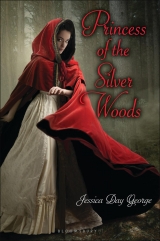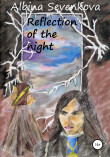
Текст книги "Princess of the Silver Woods"
Автор книги: Jessica Day George
сообщить о нарушении
Текущая страница: 3 (всего у книги 17 страниц)

Guided
Looking at Oliver sidelong as they trudged through the woods, Petunia wondered if he was staring at her more than usual today. Was it because of her nightmares? Had he heard her? He was definitely watching her, but was that only so she wouldn’t run away? They had been walking for an hour now, and Petunia could not have been more lost. The sun, which had been shining bravely through the trees as they set off, was now hiding behind gray clouds that threatened snow. Petunia pulled her cloak closer around her, but it caught on the basket and nearly made her stumble.
“All right, there?” Oliver tried to take hold of her arm, but she shook him off. “I’m just trying to help.” He held up his hands in a placating gesture.
“I’m fine,” Petunia said, not caring that she didn’t sound fine, or very gracious, either.
“At least if it snows, no one can lose you,” Oliver said, in what Petunia assumed was an attempt at humor. He indicated her red cloak.
She didn’t bother to reply.
Petunia could not wait for her humiliation to end. If Poppy ever found out about this, she would never let Petunia live it down. First she had been kidnapped while relieving herself—or nearly so—despite having her pistol at hand, and then she had embarrassed herself further by raving in her sleep all night. She was sure that everyone in that crumbling old hall had heard her—how could they not? The walls were riddled with holes!
In the first few years after they had defeated the King Under Stone, Petunia had suffered only the occasional nightmare. And most of the time, these nightmares were about perfectly mundane things, like tripping and chipping her front teeth or finding a spider in her shoes. So when the dreams about the Kingdom Under Stone had started to come more regularly, she thought that it was just memories combining with other fears. But by last year they had become a nightly event and not just for Petunia, but for all twelve sisters.
Jonquil suffered the most. She had to take a potion that their oldest brother-in-law, Galen, prepared for her every night, otherwise she was too frightened to even close her eyes. Although the potion was supposed to bring dreamless sleep, she still woke more often than not, screaming and drenched in sweat. Always willowy, Jonquil was becoming gaunt, picking at her food and not paying half as much attention to her appearance as she once had, which worried them all.
Petunia heartlessly wished that Jonquil had been the one who had been kidnapped. She wouldn’t have slept at all. Petunia had awakened herself shouting abuse at Kestilan, the youngest son of the King Under Stone, who came to her every night and told her that she belonged to him, and only him, forever. She was fairly certain that some of the words she used were of the sort that princesses weren’t even supposed to know, let alone shout in their sleep. At least Oliver wouldn’t be speaking to anyone who knew her, like the grand duchess, and couldn’t carry tales about her behavior.
“If you would just tell me how to get to the grand duchess’s estate,” Petunia said after a long period in which their feet crunching the cold, dead leaves was the only sound, “I can get there by myself.”
“I wish I believed that,” Oliver began.
“Excuse me?” Petunia bristled. “I think I am perfectly capable of finding a large estate that is only a stone’s throw from the main road, thank you!”
She hated being condescended to. Her older sisters still treated her like a child because she was the youngest, and her father was little better. In his eyes, she was perpetually six and needed to be led by the hand all the time. Yet he trusted her to work in his hothouses. Perhaps he didn’t think flowers required much maturity, just intuition. Reiner Orm, the gardener, certainly didn’t think that she belonged there, now or ever. But then, Herr Orm would never forgive her for once using a rosebush as kindling for a campfire nearly eight years before.
“I’m sorry,” Oliver said, surprised at her reaction. “I didn’t mean anything like that. I just meant that it’s easy to get lost in the forest. We’re cutting straight across the thickest part, using the deer paths. We won’t reach the road until we’re nearly there, and then you can go it alone if you like. But there’s wolves in the forest—”
“I’m well aware of that,” Petunia said. He had his gray leather wolf mask dangling from the hood of the cloak he wore over his more practical coat, in case he needed to disguise himself, she supposed.
“I meant real wolves,” he said, his cheeks red. He brandished the rifle he was carrying.
Petunia didn’t answer that, either. He was right, though. When her father had first heard the reports about the wolves in the woods a few years ago, he had sent out hunters to find them, assuming that the first garbled report of a coach being attacked had meant that four-legged wolves were growing bolder with the coming winter. The clarification that it was men in wolf masks attacking the coaches had meant only that a different kind of hunter was sent out. Their lack of success, Petunia realized, was probably in part due to Oliver and his men making their home in what was now Analousia.
She supposed she should be grateful that he was willing to guard her all the way to the grand duchess’s. He could have simply turned her loose in the forest to make her own way. But she was too tired to be grateful, or gracious, and merely trudged alongside him.
She didn’t remember being tired all the time as a child, though her sisters spoke with horror of the long days and even longer nights that they had endured at the Midnight Balls. Petunia did remember being sick toward the end, so sick that it hurt to move, but having to dance with Kestilan all the same. Jonquil, in particular, grew hysterical at any mention of the balls, and she, Hyacinth, and Iris still refused to dance no matter the occasion.
Petunia, however, had been delighted when Poppy had come home from Breton three years before with a renewed fondness for dancing. Petunia had missed dancing, and she had been hopeful that her time at the Russakan court would allow her plenty of opportunities to do so. But the letter of introduction that her father had sent with her to the Emperor of Russaka had excused her from dancing, saying that she was incapable of such strenuous activity.
She knew that her father had meant well, had been trying to save her from something that he assumed she held in disgust, but it had made Petunia’s stay in Russaka dreadfully awkward. Not only was she forced to spend every ball sitting with the chaperones, but the letter gave the impression that she was an invalid. The Russakan people were very vigorous, enjoying all sorts of outdoor events as well as dances and parlor games that involved running through the sprawling Imperial palace, hiding in wardrobes and under beds.
Petunia, just twelve at the time and only allowed to put her hair up and wear ball gowns because she was on a “state visit,” had been anxious to join in, but it was not to be. Instead she sat beside great ladies like the Grand Duchess Volenskaya and judged the games, trying to smile bravely as she handed out boxes of sweets or bottles of scent to other girls who had ridden their ponies over elaborate steeplechase courses or hidden longer than any other guest or danced particularly well.
Her hero had been the grand duchess’s grandson, Prince Grigori. Though older than she, he had gone out of his way to make Petunia feel welcome, sitting beside her through many of the games and dances so that she wasn’t lonely, with all the chaperones’ talk of “grandchildren and poor health” as he had put it. He also spoke impeccable Westfalian, thanks to his Westfalian grandfather, and was able to teach her a great deal of Russakan during her year at the court.
Which led to her being here, in the middle of the forest with a cold nose and dead leaves catching at the hem of her beautiful new cloak. When the grand duchess had invited Petunia to keep her company at her Westfalian estate, she had mentioned specifically that her favorite grandson would be there.
“I must have all my favorites about me,” the elderly lady’s letter had said. “And that includes my most dashing grandson as well as my most beautiful flower princess.”
“We’re almost there,” Oliver said.
Once again Petunia was so startled that she tripped and would have fallen if Oliver hadn’t caught her around the waist and pulled her upright.
“You must have been far away,” he said, laughing. He was so close that his breath stirred her hair.
“I’m right here,” she said, shrugging him off.
“I meant in your head,” he said.
Petunia straightened her cloak with as much dignity as she could manage. “I suppose I was,” she conceded. “Not that your conversation isn’t riveting.”
She was pleased to see him turn red again, but then she felt ashamed. It was the kind of comment that Jonquil could carry off but Petunia never could. Jonquil would say such things to her suitors, and they would fall over themselves trying to please her. Oliver just looked hurt.
“I’m sorry,” she said. “Did you say that we’re almost there?”
“Yes. The road is just through those trees. Once we reach it, we’ll only be a few minutes from the estate.”
“Oh,” she said, hardly showing a sparkling wit herself.
They walked in silence until they were standing atop a low bank that looked down on the road. Petunia hopped down the bank, glad for the hard-packed dirt of the road to walk on. Struggling over hidden rocks and tree roots had mostly ruined her low boots, which were for riding in a comfortable coach and not foot travel.
“It’s to the right,” Oliver instructed, sliding down the bank to stand beside her on the road. He started to lead the way.
“Is it far?” She did a little skip to catch up to his longer legs.
“Not far,” he said. He pointed at the other side of the road, which was just as dark with forest. “If you go just past the first line of trees, there’s a wall that surrounds the estate’s grounds.”
“Really?” Petunia peered through the thick trunks but couldn’t make out a wall.
“It’s made of a brownish gray stone,” Oliver said. “It’s fairly hard to see from here.”
“Are the grounds quite large?”
“Very,” Oliver said, and his voice was strained.
Petunia gave him a quick look. She was hit, suddenly, with how hard this must be for him. He had been disinherited through no fault of his own; he had lived most of his life in the forest, responsible for the survival of dozens of people; and now, because of her, he had to see his old home again, the home that had been given to someone else.
“If it’s only a few minutes walk, I can go alone,” Petunia said. She gave him a quick smile. “I’m not trying to be rude, but won’t it be better for you if you’re not seen? I can tell them that I got lost and made my own way here.”
“That would be better,” Oliver admitted. “But are you sure that you can find the way?”
She raised one eyebrow.
“Yes, all right,” he said with a laugh. “I’m sure that you’re capable of following a road! Well then, just follow it around this bend; the wall comes right up alongside the road. The gates are perhaps a mile along, you can’t miss them.” He swept a low bow. “And so, princess, this lowly earl will bid you farewell!”
Petunia felt another stab of pity for Oliver, and guilt over her own behavior. She gave him a proper curtsy, as befit an earl.
“Thank you for all your help,” she told him.
“The pleasure, I assure you, was mine,” he said, and bowed again. This time Petunia couldn’t detect any irony in the gesture.
“Please give my best to your mother,” she said. “And convey my wishes for a speedy recovery to your brother.” She gave him a small smile, and then turned, feeling self-conscious, and continued on up the road.
After a moment, she looked over her shoulder, pretending to fuss with the way her basket hung over her elbow. Oliver was gone, and the road was empty.

Hidden
Oliver faded back into the forest, putting on his mask out of habit. He kept to the side opposite the estate wall, staring at Petunia. If the princess couldn’t find the gates to the estate from that point, she really was more helpless than a babe, but still he watched. Oliver knew that if he didn’t report back to his mother that he had seen her safely through the gates, he would never be forgiven.
Besides which, his mother wasn’t the only person who wanted to make sure she was safe.
He could feel the knot of tension between his shoulder blades beginning to unravel. She was almost there. Now he could relax and just go back to the old hall and be what he was: a disgraced earl with nothing more pressing on his mind than whether to rob the very next traveler on the main road or wait a few days.
Oliver sidled through the trees. There was a crash and a roar of sound from the direction of the still-hidden gates. Oliver saw Petunia freeze in the middle of the road, her right hand reaching into her basket for her pistol. Why didn’t she move? Oliver knew exactly what that sound was, but she just stood there with her head cocked in curiosity.
Oliver didn’t hesitate for another second. He ran for the princess. She still hadn’t moved when he reached her, dragging her to the opposite side of the road. They tripped over each other’s feet and fell against the leaf-strewn bank. She screamed, but Oliver wasn’t sure if it was because of him or because of the pack of hunters who were bearing down on them. Had he not hauled her out of the way, the superb black stallion at the front would have run her down.
“Out of the way,” the black horse’s rider shouted, brandishing his whip. It snapped out and nearly struck Oliver’s cheek, which was fortunately still covered by his mask.
“Watch yourself!” Oliver shouted back.
Oliver could feel Petunia trembling with shock. He scrambled to his feet and helped her up. Her cloak was covered with leaf mold, and the hood had fallen back to show all her masses of curls. Her eyes were extremely wide, and her face was very white. Oliver could see that she realized now just how close she had come to dying under the hooves of that horse.
Knowing that the sight of his wolf mask was only adding to her fright, Oliver reached up to unfasten it, but Petunia put out a hand to stop him. She darted a look over her shoulder at the rider, who was now bringing the black horse around, whip still raised.
“Gypsies, are you? Stay out of the road,” the rider said in faintly accented Westfalian. He was very tall and had dark hair beneath a black hat. Petunia was staring up at him.
“Run,” she said, her voice soft.
“What?” Oliver leaned in closer.
Petunia turned and pushed his chest, nearly sending him onto his rump with surprise. “Run!”
“You there!” The rider was standing in his stirrups, his whip coming down to point at Oliver. “Why are you wearing that mask?”
“Your Highness,” called out one of the other men. “It’s the princess! The Wolves have kidnapped the princess!”
“Run, you fool,” snapped Petunia, and then she lunged forward and caught the black horse’s reins just as its rider spurred it toward Oliver.
Oliver didn’t want to run, but he was no fool, regardless of what Petunia thought. He spun and ran through the forest as though all the hounds of hell were after him. Which, to a certain extent, they were.
“Prince Grigori,” Petunia called out. “Stop!”
Oliver felt sick. This was Prince Grigori, the beloved grandson of the Grand Duchess Volenskaya? He and his black horse were no strangers to Oliver, though he had never known the man’s name. This man was the leader of the hunters who had been tracking Oliver and his men for months, hounding them at every turn.
If the Russakan prince was hunting for human wolves in Westfalin, then Oliver had no doubt that Grigori had the blessing of King Gregor and probably King Phillippe of Analousia as well. Oliver and his men crossed the border with impunity and had robbed travelers from many lands. But even knowing his own crimes, Oliver had hoped that the men hunting them were vigilantes who had simply lost a purse or two to the bandits. That way Oliver had no qualms about evading them or taking stronger action if the hunters came too close to the old hall. But if they had royal support, any retaliation would be treason as well as murder.
Oliver was on the wrong side of the road now, with the wall of the estate preventing him from fading into the forest, and the hunters were almost outpacing him. He would have to take to the trees or go over the wall and hide on the grounds for a time.
When he thought the trees were thick enough to conceal him, he stopped and listened until he heard the horses go past. Oliver located a sturdy elm that had branches that hung over the wall of the estate and swung himself up. He sat in the crook of one of the larger branches and listened some more, pushing back his hood so that he could hear better. They were definitely on foot now; the underbrush was too thick for a mounted search.
Oliver leaned along the branch as far as he could, looking through the dry, rattling leaves that still clung to the winter branches. There was no snow on the yellowed lawns of the estate, and the bareness of the bushes and trees provided little concealment. It had been a terrible winter: bitter cold yet with little snow.
Still, if he made a break back through the trees he would have to cross the road at some point, and he felt certain that Grigori would catch him. So instead Oliver quickly shed his mask and cloak and bundled it into another crook of the tree’s branches. It looked rather like a large, mossy nest. Then he slithered out to the end of the branch, which bent under his weight and dropped him down on the grounds of the estate, hidden from Grigori and his men by the high wall.
Straightening his leather jerkin, he did his best to look like a gardener off on some serious task, and strode along one of the winding gravel paths where he had played as a small child. If memory served, there were several outbuildings on the grounds. One of them was bound to be empty, and he could hide for a time before slipping back over the fence and on his way.
He came around a large juniper bush and nearly bumped into two men with a wheelbarrow full of dead branches. Oliver froze for a moment, but the men just nodded and continued on. Oliver managed to fight down the urge to flee, and nodded back. As he passed them, forcing himself to walk with purpose, he heard one of the men say, “Another new one. I wonder which of us got the ax this time.”
To Oliver’s immense relief, another turn of the path brought him to the hothouses. In his childhood the last one in the row had been a treasure trove of old potting tables and other discarded paraphernalia. Peering through the old, dingy glass he saw that it was not being put to any better use now. He unlatched the door and hurried inside.
Nothing had changed. Oliver could have navigated the rickety tables and cracked urns with his eyes closed. The floor at the front was remarkably clean, but that was the only improvement. He found the old bench just where he had left it. It was stone, badly chipped, and covered in a thick layer of old burlap sacks. Oliver shoved them to the floor, coughing at the resulting cloud of dust, and settled himself on the bench. He braced his feet on the edge of one of the tables and tried to rest. It would be far easier to leave in the dark. The hunters were rarely out then, afraid of running into four-legged wolves or having a horse put a foot wrong.
It was late afternoon, and the sky was already beginning to darken, so he knew he wouldn’t have long to wait. But as the purple-gray twilight took over the weak winter day, Oliver fell asleep.

When he awoke it was completely dark. The darkness was strange and thick, and Oliver thought he heard someone whispering. He sat up very slowly and peered into the blackness. The door opened, and Oliver made himself as still as possible. Every urn in the hothouse rattled, as though there was an earthquake, but Oliver felt nothing. There was a howl of laughter and the hothouse door slammed shut, leaving Oliver feeling distinctly alone. But if he was alone now, what had been in the hothouse with him a moment before?
Cursing, he stumbled through the darkness. Once he reached the door, he slipped through, pausing only for a moment to listen for someone outside. Shadows seemed to wind through the hedges, shadows that had nothing to do with the moonlight and the pattern of darkness cast by the trees and shrubs. Oliver followed in the wake of the weird shadows, across the lawns, to the great estate house itself.
It was very late, and all the windows were dark. Oliver found himself praying silently that someone would light a lamp or a candle, even if the light exposed him. What were those things crawling across the lawn? With a mounting sense of horror, he saw the dark shapes reach the house.
With a terrible laugh, the shadow creatures pulled themselves up the wall to a window on the second floor that was open despite the cold. Oliver hid behind a fountain. The room they had just entered had been his childhood bedroom. Whose was it now? He prayed again, this time that the room had not been given to Petunia.
His question was answered a few moments later when a young woman’s voice cried out, the sound carrying clearly through the open window. She screamed out denials, she screamed out insults, and over and over again she reviled someone called “Kestilan.”
“Oh, ye gods, Petunia,” Oliver whispered from his concealment. “What is all this?”
Oliver didn’t know what to do. There were … things crawling up the wall of the manor house. He was armed, but what would he be shooting at? Shadows moving on the wall? And what if he fired through the window and hit Petunia?
Something rushed by him, cackling, and Oliver swung at it. His arm went cold where it passed through the shadow, but there was nothing of substance to meet his fist. The attempted punch did not go unnoticed, however, and the shadow creature turned and hovered in front of Oliver.
“Stay away from her,” Oliver said, trying to sound dangerous and not terrified.
Another cackling laugh. The shadow reached out and put its hand into Oliver’s chest. A sheath of ice instantly covered his heart, and then the shadow squeezed. Oliver gasped as intense pain flared in his chest, streaking through his entire body. He tried to step back but found that he couldn’t move so much as an eyelid.
“She is not for you,” the shadow said in a low, harsh voice. “She is for us. All of them are for us.”
“No,” Oliver gasped out.
“Yes,” the shadow snarled.
Then it pulled its hand back. Oliver fell to his knees, choking for air.
“What are you?”
But the shadow was gone.
Oliver struggled back to his feet, clutching his chest in one hand. He looked around, but he was alone in the garden now. Through Petunia’s window he could still hear faint cries.
No one in the house seemed to have been roused at all. How was it possible that these creatures could have attacked the house and he was the only witness? Hadn’t even her maid heard her screaming and come to see if she was all right?
Oliver crept closer to the house, stopping behind a large azalea. Squinting at the darkness of her window, he saw a figure in white. It was Petunia. She pushed the curtains aside and stood there for a few heartbeats, then closed them with a jerk.
“There,” Oliver muttered to himself. “She’s fine. Whatever those things were, they’re gone. And there’s nothing I can do to help her, anyway.”
But that was a lie, and Oliver knew it. He had to help her, somehow. Something or someone had set out to harm Petunia. Someone far more wicked than himself, with his coach robbing and his botched abduction of the princess.
And yet, what could he do to help? The first step would be getting out of the garden and back to the old hall. His mother might know more and be able to help him decide what to do from there. But in the back of his head, Oliver was already entertaining a terrible thought.
It was time for him to go to Bruch. And King Gregor.








